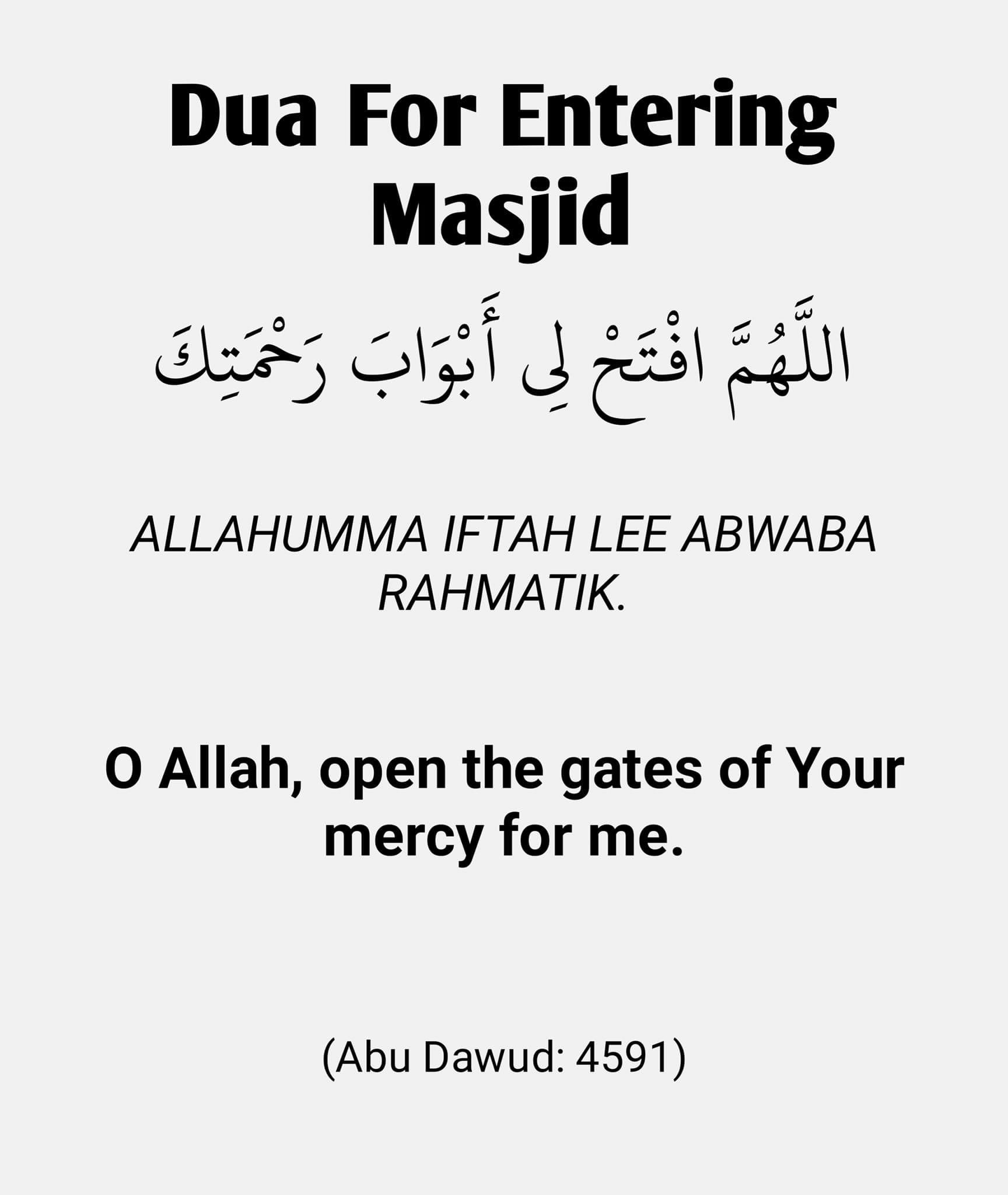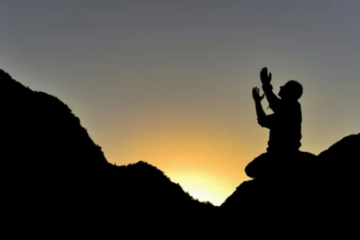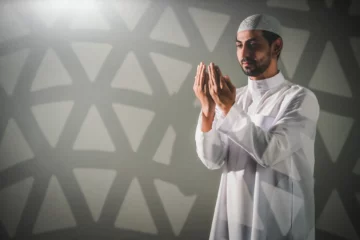In today’s fast-paced world, finding moments of peace and tranquility can be a challenge. However, stepping into the sacred space of a masjid (mosque) can provide a sanctuary from the chaos of everyday life. And what better way to prepare oneself for this spiritual journey than through dua before entering masjid?
Dua, the act of supplicating to the Almighty, holds immense power. It allows us to connect with our Creator, seek His guidance, and express our deepest desires. By uttering heartfelt prayers, we invite divine blessings into our lives, hoping that they will guide and protect us.
Before entering the masjid, Muslims often engage in dua, beseeching Allah Almighty to open the gates of His mercy and grant them tranquility and enlightenment within the sacred space. This spiritual practice serves as a beautiful reminder of our reliance on the Divine and sets the tone for a profound spiritual experience.
In this article, we will explore the significance of dua before entering the masjid and delve into the blessings it can unlock. Join us on this spiritual journey as we unveil the power of prayer and discover the divine blessings that await within the walls of the masjid.
Understanding the significance of prayer in Islam
Prayer holds a profound significance in the faith of Islam. As the second pillar of Islam, it is a fundamental aspect of the religion that connects believers to their Creator. Through prayer, Muslims seek to establish a direct line of communication with Allah, the Almighty, expressing their gratitude, seeking guidance, and submitting to His will.
Prayer, or “salah” in Arabic, is a ritual that involves specific movements, recitations, and invocations, all of which are prescribed by the Prophet Muhammad (peace be upon him) and recorded in the Quran and Sunnah. It is a means for Muslims to fulfill their religious obligations, cultivate spiritual awareness, and maintain a strong relationship with the Divine.
The significance of prayer in Islam extends beyond its ritual aspects. It is a powerful tool for personal growth, introspection, and seeking forgiveness. Through the act of prostration and humility before Allah, Muslims are reminded of their own insignificance in the grand scheme of the universe, fostering a sense of humility and reverence for the Almighty. Prayer also serves as a source of comfort, solace, and strength, helping believers navigate the challenges of life with a steadfast faith in the Divine plan.
The purpose of dua before entering the masjid
Dua, the act of supplicating to Allah, holds a special significance in Islam, particularly when performed before entering the masjid (mosque). The masjid is considered a sacred space, a sanctuary where believers can connect with their Creator, engage in communal worship, and seek spiritual enlightenment.
Before stepping into this holy place, Muslims are encouraged to offer dua, asking Allah for His blessings, guidance, and protection. This practice serves as a means of preparing the heart and mind for the spiritual journey ahead. By invoking the name of Allah and expressing one’s deepest desires, the individual is able to create a state of mindfulness and reverence, setting the tone for a more meaningful and impactful experience within the masjid.
The purpose of dua before entering masjid is multifaceted. It allows the believer to acknowledge their dependence on Allah, seek His pleasure, and open their heart to the divine guidance that may be bestowed upon them during their time in the sacred space. Additionally, dua before entering masjid serves as a way to purify the intention, ensuring that the individual’s actions are driven by a sincere desire to please Allah and not by worldly motives or distractions.
The spiritual benefits of dua before entering masjid
Performing dua before entering masjid can unlock a myriad of spiritual blessings for the believer. One of the primary benefits is the sense of humility and closeness to Allah that it cultivates. By humbly beseeching the Almighty for His mercy and guidance, the individual is able to shift their focus from the material world to the realm of the Divine, fostering a deeper connection with their Creator.
Moreover, dua before entering masjid can serve as a means of purification, both spiritually and mentally. The act of invoking Allah’s name and seeking His forgiveness can help cleanse the heart and mind of any lingering negativity, such as anger, jealousy, or worldly preoccupations. This state of spiritual and mental clarity can then be carried into the masjid, allowing the individual to engage in worship and contemplation with a heightened sense of focus and devotion.
Another significant benefit of dua before entering masjid is the potential for answered prayers. When a believer sincerely and humbly supplicates to Allah, they open themselves up to the possibility of divine intervention and blessings. These blessings may come in the form of guidance, protection, or the fulfillment of their heartfelt desires, all of which can have a profound impact on their spiritual and personal well-being.
Steps to perform dua before entering masjid
Performing dua before entering masjid is a simple yet powerful practice that can be carried out by any Muslim. The following steps outline the recommended process:
- Perform ablution (wudu): Before engaging in dua, it is important to perform the ritual ablution, which involves washing specific parts of the body. This act of physical cleanliness helps to prepare the individual for the spiritual journey ahead.
- Face the direction of the qibla: The qibla is the direction of the Kaaba in Mecca, which Muslims face during their prayers. When performing dua before entering masjid, it is recommended to face the qibla as a sign of unity and reverence towards the sacred site.
- Invoke the name of Allah: Begin the dua by invoking the name of Allah, the Almighty, as a way of acknowledging His sovereignty and seeking His blessings.
- Express gratitude and humility: After invoking the name of Allah, express gratitude for the opportunity to visit the masjid and approach the Almighty with a sense of humility and reverence.
- Seek guidance and protection: In the dua, ask Allah to guide you, protect you, and grant you the ability to engage in worship and contemplation within the masjid.
- Conclude with additional supplications: Conclude the dua by making any additional supplications or requests that are close to your heart, always remembering to submit to the will of Allah.
By following these steps, individuals can create a meaningful and impactful dua before entering masjid, setting the stage for a profound spiritual experience.
The etiquette of dua before entering masjid
Performing dua before entering masjid is not just a matter of reciting a few words; it requires adherence to specific etiquette and guidelines to ensure that the supplication is accepted by Allah. These guidelines help to cultivate a state of humility, reverence, and sincerity, which are essential for effective and meaningful prayer.
One of the primary etiquettes of dua before entering masjid is maintaining a state of cleanliness and purity. As mentioned earlier, it is recommended to perform the ritual ablution (wudu) before engaging in the supplication. This act of physical cleanliness serves as a symbolic representation of the individual’s desire to approach the Almighty with a clean heart and mind.
Another important aspect of the etiquette is the posture and demeanor of the individual during the dua. It is recommended to stand with a humble and reverent posture, avoiding any displays of arrogance or self-importance. The eyes should be cast downward, and the individual should approach the Almighty with a sense of awe and submission.
Additionally, it is crucial to maintain a state of focus and concentration during the dua. Believers should avoid any distractions or wandering thoughts, and instead, direct their full attention towards the supplication and the presence of Allah. This level of focus and dedication helps to ensure that the dua is sincere and heartfelt, increasing the likelihood of it being accepted by the Almighty.
Dua before entering masjid
The specific dua for entering the masjid is both beautiful and meaningful. It reflects the believer’s hope for mercy, the pursuit of Allah’s forgiveness, and a desire for righteousness:
اللّهُـمَّ افْتَـحْ لي أَبْوابَ رَحْمَتِـكَ
Transliteration: “Allahumma iftah li abwaba rahmatik”
Translation: “O Allah, open for me the doors of Your mercy.”
This simple yet profound dua reminds the worshiper of Allah’s boundless mercy and the need for divine assistance. By asking Allah to open the doors of His mercy, the individual acknowledges their dependence on His grace for both worldly and spiritual matters.
Common misconceptions about dua before entering masjid
Despite the widespread practice of performing dua before entering masjid, there are a few common misconceptions that often arise among some individuals. It is important to address these misconceptions to ensure a proper understanding of this spiritual practice.
One common misconception is that dua before entering masjid is an optional or unnecessary ritual. Some may view it as a mere tradition or cultural practice, rather than a recommended and beneficial act in the eyes of Allah. However, the Islamic tradition strongly encourages the performance of dua before entering masjid, as it helps to prepare the heart and mind for the spiritual journey ahead.
Another misconception is that the specific wording or format of the dua is more important than the sincerity and intention behind it. While it is true that there are recommended phrases and etiquette to follow, the primary focus should be on the individual’s connection with Allah and their heartfelt supplication. The Almighty is more concerned with the state of the heart than the precise words used.
Furthermore, some may believe that the act of performing dua before entering the masjid is a means of showing off or seeking the approval of others. This is a grave misconception, as the purpose of dua is to establish a direct and personal connection with Allah, without any concern for the opinions or judgments of others. The act of dua should be carried out with sincerity, humility, and a genuine desire to please the Almighty.
The impact of dua before entering the masjid on our daily lives
The practice of performing dua before entering masjid can have a profound and lasting impact on an individual’s daily life. By cultivating a habit of connecting with the Almighty through this spiritual exercise, believers can experience a profound shift in their mindset, priorities, and overall well-being.
One of the primary ways in which dua before entering masjid can impact daily life is by instilling a deeper sense of reliance on Allah. When an individual consistently seeks the guidance and blessings of the Almighty before entering the sacred space, they are reinforcing their understanding of their own limitations and the need to submit to the Divine will. This mindset can then be carried throughout the day, helping the believer to navigate challenges and decisions with a greater sense of trust in Allah’s plan.
Moreover, the act of dua before entering the masjid can serve as a powerful reminder of the importance of maintaining a spiritual focus amidst the distractions and demands of everyday life. By taking the time to connect with the Almighty before entering the masjid, the individual is setting the tone for a more mindful and intentional approach to their daily activities. This can lead to a greater sense of presence, gratitude, and spiritual awareness, which can positively impact their relationships, work, and overall well-being.
Additionally, the blessings and answered prayers that may result from the dua before entering masjid can have a tangible impact on an individual’s daily life. Whether it is guidance, protection, or the fulfillment of a heartfelt desire, these divine interventions can provide a sense of reassurance, comfort, and empowerment that can carry over into all aspects of the believer’s life.
Conclusion: Embracing the power of dua before entering the masjid
In the fast-paced world we live in, finding moments of peace and spiritual connection can be a challenge. However, the act of performing dua before entering the masjid offers a profound opportunity to bridge the gap between the material and the divine, unlocking a world of blessings and spiritual enlightenment.
Through the practice of dua, believers can cultivate a deeper sense of humility, reverence, and reliance on the Almighty. By acknowledging their dependence on Allah and seeking His guidance and protection, they are able to approach the sacred space of the masjid with a heightened state of mindfulness and spiritual awareness.
The blessings that can flow from this simple yet powerful act are truly remarkable. From the purification of the heart and mind to the potential for answered prayers and divine intervention, dua before entering the masjid can have a transformative impact on an individual’s daily life, strengthening their faith, providing solace in times of uncertainty, and guiding them towards a deeper connection with the Divine.
As we navigate the challenges and complexities of the modern world, let us embrace the power of dua before entering the masjid. By making this spiritual practice a regular part of our lives, we can unlock the gates to the divine blessings that await us within the sacred walls of the masjid, and in turn, experience a profound and lasting transformation in our relationship with the Almighty.




